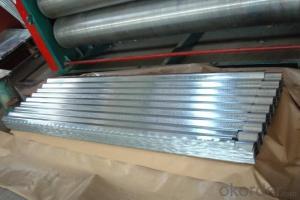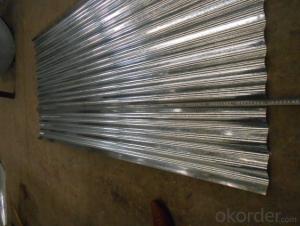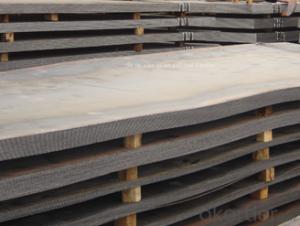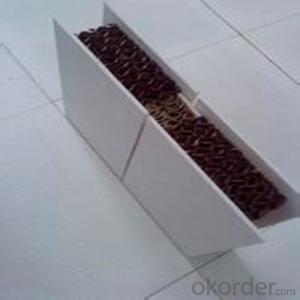HOT DIPPED GALVANIZED STEEL CORRUGATED SHEETS
- Loading Port:
- Tianjin
- Payment Terms:
- TT OR LC
- Min Order Qty:
- -
- Supply Capability:
- 10000 m.t./month
OKorder Service Pledge
Quality Product, Order Online Tracking, Timely Delivery
OKorder Financial Service
Credit Rating, Credit Services, Credit Purchasing
You Might Also Like
GALVANIZED STEEL CORRUGATED SHEETS
THICKNESS:0.14mm
WIDTH:800mm(AFTER CORRUGATION)
LENGTH:3048mm
ZINC COATING:80g/m2
STANDARD:JIS G 3302, SGCH (HARD QUALITY:75HRB-90HRB)
SURFACE:REGULAR SPANGLE, CHROMATED, DRY
PACKAGE WEIGHT:ABOUT 3 TONS
PAYMENT TERM:30% TT advance,70% against BL copy OR 100% LC AT SIGHT.
SHIPMENT: WITHIN 35 DAYS AFTER RECEIVING THE DEPOSIT.
DOUCUMENTS:COMMERCIAL INVOICE IN THREE ORIGINAL,PACKING LIST IN ONE ORIGINAL AND SPECIFICATION,CERTIFICATE OF ORIGIN.
ORIGIN:MADE IN CHINA
LABEL INFORMATION:AS REQUEST.
PORT OF LOADING: XINGANG PORT, CHINA
- Q:What is the typical price range for steel sheets?
- The price of steel sheets can fluctuate based on multiple factors, including the type and grade of steel, the thickness and size of the sheets, and the prevailing market conditions. Typically, the price range for steel sheets can vary from approximately $30 to $200 per sheet. Nevertheless, it is crucial to bear in mind that these figures are only approximate and can experience substantial fluctuations. To obtain the most precise and current pricing details for steel sheets, it is strongly advised to consult local suppliers or manufacturers.
- Q:Are steel sheets suitable for chemical storage tanks?
- Yes, steel sheets are generally suitable for chemical storage tanks. Steel is known for its strength, durability, and corrosion resistance, making it a suitable material for storing a wide range of chemicals. However, the specific type of steel and its coating should be carefully selected to ensure compatibility with the chemicals being stored to prevent corrosion or contamination. Regular inspections and maintenance are also necessary to ensure the longevity and safety of steel storage tanks.
- Q:Can steel sheets be formed into corrugated panels?
- Yes, steel sheets can be formed into corrugated panels.
- Q:Can steel sheets be used for kitchen or food preparation areas?
- Yes, steel sheets can be used for kitchen or food preparation areas. Steel is a durable and hygienic material that is resistant to corrosion, heat, and staining. It is commonly used in commercial kitchens and food processing facilities due to its easy cleaning properties and ability to withstand heavy use.
- Q:What are the different types of finishes available for steel sheets?
- There are several types of finishes available for steel sheets, including mill finish, brushed finish, mirror finish, galvanized finish, and painted finish.
- Q:How do steel sheets handle expansion and contraction?
- Steel sheets handle expansion and contraction in a predictable and controlled manner due to their unique properties. Steel is known for its high strength and durability, which allows it to withstand the forces exerted during expansion and contraction without losing its structural integrity. When steel sheets are exposed to high temperatures, such as during welding or in extreme environmental conditions, they tend to expand. This expansion occurs because heat causes the steel molecules to move more rapidly, resulting in an increase in size. However, steel has a relatively low coefficient of thermal expansion, meaning it expands less compared to other materials like concrete or wood. This property makes steel a preferred choice in various applications where dimensional stability is crucial. To handle expansion, steel sheets are often designed with expansion joints or gaps that allow for movement. These joints can be found in structures like bridges, buildings, or pipelines. These gaps are strategically placed to accommodate the anticipated expansion and contraction of the steel sheets without causing any damage or deformation. Additionally, steel's ability to contract is equally important. When exposed to lower temperatures, steel sheets contract or shrink. This contraction is typically less noticeable compared to expansion but still needs to be considered in engineering designs. The contraction of steel is generally not a concern, as it is within the acceptable limits and does not compromise the structural integrity of the material. Overall, steel sheets are engineered to handle expansion and contraction effectively. The low coefficient of thermal expansion and the presence of expansion joints allow steel to accommodate temperature fluctuations without causing significant stress or deformation. This makes steel a reliable and versatile material for various industries, including construction, manufacturing, and infrastructure.
- Q:Can the steel sheets be used in harsh environments?
- Yes, steel sheets can be used in harsh environments. Steel is a strong and durable material that can withstand extreme temperatures, heavy loads, and exposure to moisture, chemicals, and other harsh conditions. Steel sheets are commonly used in industries such as construction, automotive, aerospace, and marine where they are exposed to harsh environments like high heat, corrosive substances, and heavy wear and tear. Additionally, steel can be coated or treated with protective materials to enhance its resistance to harsh environments, ensuring long-lasting performance and reliability.
- Q:What are the common sizes of steel sheets available?
- To meet the diverse needs of different industries and applications, a variety of sizes of steel sheets are available. The sizes of steel sheets can vary depending on the manufacturer and the specific requirements of the customer. However, there are standard sizes widely available in the market. The most popular sizes of steel sheets are as follows: 1. 4 feet by 8 feet: This size is widely used in construction, manufacturing, and automotive industries. It is suitable for various applications like roofing, siding, and fabrication due to its large surface area. 2. 4 feet by 10 feet: Similar to the 4 feet by 8 feet sheets, this size provides a larger surface area. It is ideal for bigger projects that require more material. 3. 5 feet by 10 feet: With an even larger surface area than the 4 feet by 10 feet sheets, this size is perfect for industrial applications that need extensive coverage. 4. 6 feet by 12 feet: This larger size is commonly used in heavy-duty applications such as shipbuilding, construction of large structures, and industrial machinery. It's important to acknowledge that these are just some of the common sizes available. Manufacturers offer many other sizes to meet specific requirements. Moreover, steel sheets can be custom-cut to fit specific dimensions, allowing for greater flexibility and tailoring to individual project needs.
- Q:Are the steel sheets suitable for automotive applications?
- Yes, steel sheets are commonly used in automotive applications due to their high strength, durability, and formability. They provide structural support, enhance crash safety, and can be easily shaped into various automotive components, making them suitable for the automotive industry.
- Q:Do steel sheets rust?
- Yes, steel sheets can rust if they are not properly protected or coated.
1. Manufacturer Overview |
|
|---|---|
| Location | |
| Year Established | |
| Annual Output Value | |
| Main Markets | |
| Company Certifications | |
2. Manufacturer Certificates |
|
|---|---|
| a) Certification Name | |
| Range | |
| Reference | |
| Validity Period | |
3. Manufacturer Capability |
|
|---|---|
| a)Trade Capacity | |
| Nearest Port | |
| Export Percentage | |
| No.of Employees in Trade Department | |
| Language Spoken: | |
| b)Factory Information | |
| Factory Size: | |
| No. of Production Lines | |
| Contract Manufacturing | |
| Product Price Range | |
Send your message to us
HOT DIPPED GALVANIZED STEEL CORRUGATED SHEETS
- Loading Port:
- Tianjin
- Payment Terms:
- TT OR LC
- Min Order Qty:
- -
- Supply Capability:
- 10000 m.t./month
OKorder Service Pledge
Quality Product, Order Online Tracking, Timely Delivery
OKorder Financial Service
Credit Rating, Credit Services, Credit Purchasing
Similar products
New products
Hot products
Related keywords






























